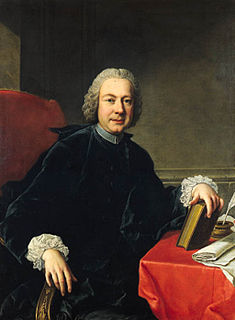A Quote by Bob Dylan
Fortune or fame, you must pick one or the other, though neither of them are to be what they claim.
Related Quotes
In handling men, there are three feelings that a man must not possess-fear, dislike and contempt. If he is afraid of men he cannot handle them. Neither can he influence them in his favor if he dislikes or scorns them. He must neither cringe nor sneer. He must have both self-respect and respect for others.
In order to carry through any undertaking in family life, there must necessarily be either complete division between the husband and wife, or loving agreement. When the relations of a couple are vacillating and neither one thing nor the other, no sort of enterprise can be undertake. Many families remain for years in the same place, though both husband and wife are sick of it, simply because there is neither complete division nor agreement between them.
Subjects who reciprocally recognize each other as such, must consider each other as identical, insofar as they both take up the position of subject; they must at all times subsume themselves and the other under the same category. At the same time, the relation of reciprocity of recognition demands the non-identity of one and the other, both must also maintain their absolute difference, for to be a subject implies the claim of individuation.
Good fortune almost always makes some change in a man's behavior - in his manner of speaking and acting. It is a great weakness to want to bedeck oneself in qualities which are not his own. If he esteemed virtue above all other things, neither the favors of fortune nor the advantages of position would change a man's face or heart.
If I ask you who is the most famous scientist who ever lived, or the greatest scientist who ever lived you'll say either Einstein or Newton or something like that because their claims were supposed to apply universally. But the claim of somebody who is studying a particular feature of the evolutionary process like whether it's very fast or very slow, or occurs in steps and so on, that's not a universal claim, that's a rather specialised claim and so you can't claim to great fame and great success.
Everybody allows that to know any other science you must have first studied it, and that you can only claim to express a judgment upon it in virtue of such knowledge. Everybody allows that to make a shoe you must have learned and practised the craft of the shoemaker, though every man has a model in his own foot, and possesses in his hands the natural endowments for the operations required. For philosophy alone, it seems to be imagined, such study, care, and application are not in the least requisite
But, you may ask, if the two departments [i.e., federal and state] should claim each the same subject of power, where is the common umpire to decide ultimately between them? In cases of little importance or urgency, the prudence of both parties will keep them aloof from the questionable ground; but if it can neither be avoided nor compromised, a convention of the States must be called to ascribe the doubtful power to that department which they may think best.




































